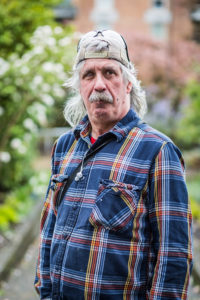Clint Reiding
The Lighthouse Gives Independence
By Linda Norlen

Clint Reiding grew up in Montana where he worked on his family owned farm and ranch. Although born with glaucoma, Clint could see well enough as a teenager that he was able to get a driver’s license. After three years of driving, he was unfortunately informed by the state licensing department that he could no longer enjoy that luxury. Clint ended up losing sight in his right eye 25 years ago, but he still has sight in his left eye and is able to use a Closed Circuit Television (CCTV), to enlarge things for greater visibility.
Clint came to the Lighthouse in 1989. At first moving to Seattle from a rural community was scary, but it was also exciting. Clint enjoyed coming to work every day and made a lot of new friends. He first started off on the burr bench in the machine shop, as many new employees have done. He then quickly became a machine operator after only two weeks on the burr bench. Clint spent a little over a decade as a machine operator before becoming promoted to machine setup. In this role, he learned how to set up several different kinds of machines, such as saws, edgers, Bridgeport horizontal mills, and on occasion, Computer Numerical Control mills – better known as CNC mills around the Lighthouse. Much of his training came from John O’Neill and Harold Martinson, who were both greatly skilled at setup, Clint says.
When Clint thinks about the past, he has fond memories of the 1990s. The company had so much work they almost didn’t know what to do with it all. In that era he also enjoyed socializing with his fellow colleagues who enjoyed going out and dancing.
One of the most positive changes Clint has seen while working at the Lighthouse is the growing presence of upward mobility within the organization. The Lighthouse gives people the opportunity to advance regardless of their condition. Clint has also witnessed how the organization has grown significantly over the years. Although he feels there is a greater distance between the workforce and management than in the past, he commends Glen McCully in the Human Resources department. Clint refers to Glen as someone who is a listening post: “You can talk to him if you need to.”
Clint is grateful for all the opportunities that the Lighthouse has been able to grant him. One in particular was the ability to purchase his own house. Clint reflects on his time in Montana and acknowledges that there would not have been a future for him over there. The Lighthouse gave him responsibility, and as a result, independence.